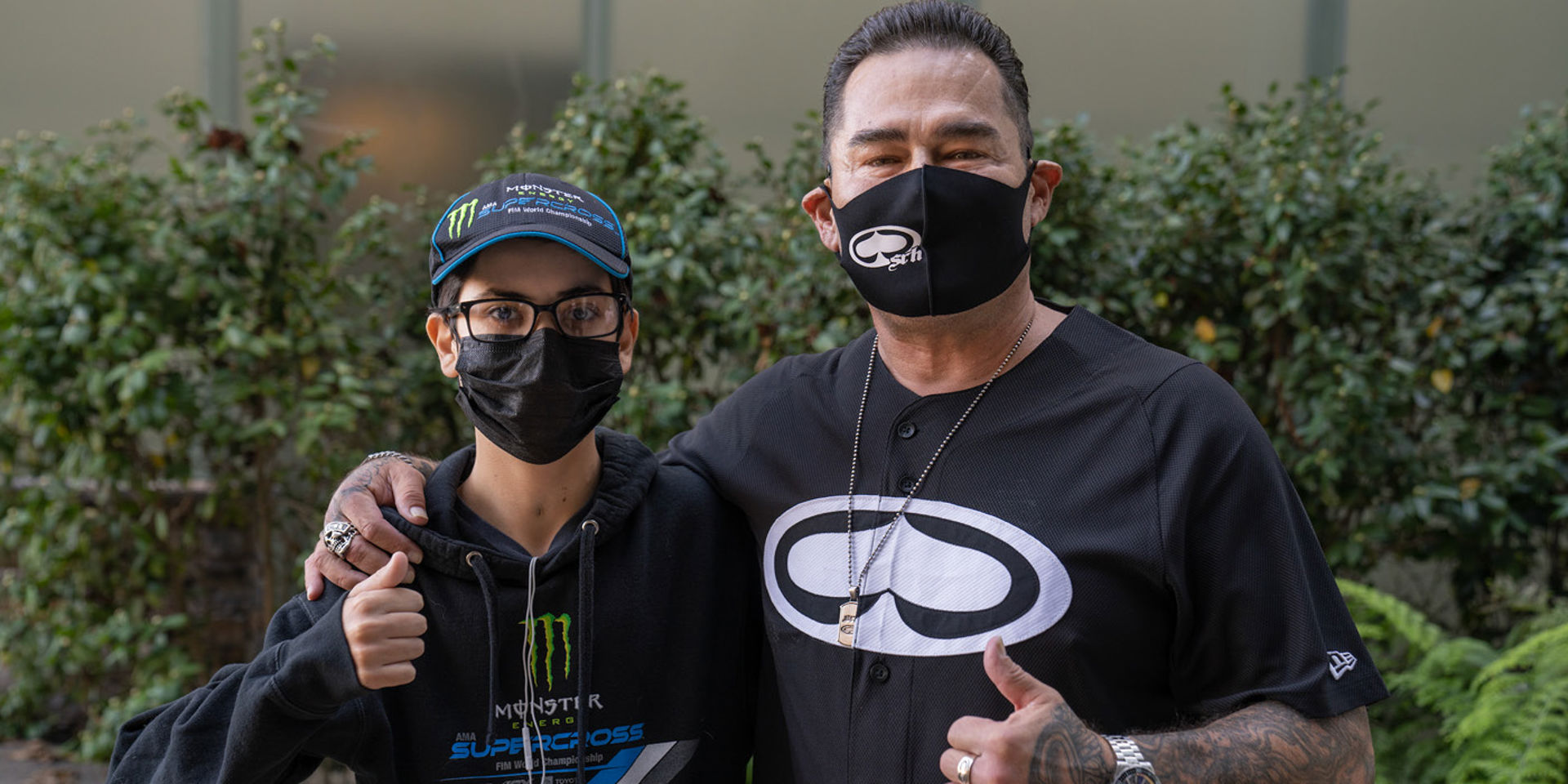
"I can feel your heart beating, bro!" Isaac Gonzalez, 19, told George Jimenez, 56, while hugging him hello during their first in-person meeting in three months. "I can feel mine, too! With my old heart, I could never feel it because it was so weak."
This year’s 81 successful heart transplants so far continue a multi-year trend in which UC San Diego Health has performed 4 to 9 times as many procedures annually as other local providers. So it doesn’t seem surprising that two of this year’s recipients should have found each other and organically forged their own personal support group.
"I was going through so much emotionally, it felt like Isaac had been put in my life for a reason," said Jimenez, an Ocean Beach resident with a six-year-old daughter, a 22-year-old son and a fiancée. "It just kind of hit me in my heart. If he can go through this and handle it at his age, then I could certainly go through and handle it at mine."
Jimenez was waiting for a heart biopsy at Sulpizio Cardiovascular Center at UC San Diego Health in March, when he asked a stranger in the waiting room where to get water. It was Gonzalez’s father, Ricky. They struck up a conversation. Afterwards, the three of them retreated to the seating area around a fountain outside for their first of about a dozen heart-to-hearts.
"To see them find each other and find inspiration in each other makes me extremely thankful," said Victor Pretorius, MBChB, surgical director of cardiac transplant and mechanical circulatory support at UC San Diego Health, who performed both transplants. "It wasn’t easy, but I think you can see that for both of them, it was worth going through all of that."
The unlikely pair refer to each other as "heart brothers," and post every day on social media about their own, and each other’s, health milestones and setbacks. Gonzalez’s parents are over the moon about their friendship.
"Isaac’s a teenager and teenagers aren’t that open with their parents," Ricky said. "George tells us what Isaac doesn’t about what he’s going through, and that helps us understand."
Gonzalez, who lives in Wildomar with his parents and recently graduated Elsinore High School, was born without a right ventricle. On the day of his delivery, he had the first of the standard three corrective surgeries (known as the Norwood, Glenn and Fontan procedures) to rearrange blood flow allowing his left ventricle to take up the slack pumping blood into his arteries. But the correction is not a cure.
"I feel like I had a normal childhood," Gonzalez said. "Not really normal, but I was able to do stuff."
Then, in 2017, a viral case of mononucleosis put Gonzalez in the hospital with fluid buildup and, eventually, heart failure. By the end of 2019, his family was out of options.
"Before that, the word ‘transplant’ was kind of thrown around a little bit," Gonzalez said. "Then it became, ‘OK, you’re going to need a transplant and we’re going to have to do it now or else you’re going to get worse and maybe not live.’"
Jimenez, a former journeyman carpenter for the San Diego Unified School District, was forced to retire 10 years ago when he developed congestive heart failure and could no longer even swing a hammer. Slowly, his heart declined to only 13 percent efficiency.
Six weeks after Jimenez was placed on the heart transplant list, he received his new heart thanks to DCD (Donation after Cardiac Death). In September 2020, UC San Diego Health became the first hospital on the West Coast to perform DCD heart transplants and remains the only one. In DCD, the donor has experienced devastating and irreversible brain injury. As soon as their heart stops, it is removed, although their brain does not yet meet the formal criteria for brain death.
"If we get those organs within an acceptable period of time, we can perfuse the heart with a machine that gets the function to return and once the heart passes all the tests, then we can use it," Pretorius explained.
This year so far, 43.5 percent of UC San Diego Health’s heart transplants have come from DCD donors. Pretorius calls the approach "a total game-changer."
"It’s opened up the donor pool significantly for our program," he said. "People who would have waited for years are now getting opportunities to be transplanted right away. Our wait-list mortality and our wait-list time have both decreased significantly."
In June 2020, Gonzalez was placed on the transplant list at another regional hospital, where he waited for six months before the hospital transferred him to UC San Diego Health and a heart arrived one month later.
"When we stopped in the hall to say goodbye to my parents and my sister, I had that thought that, ‘OK, this could be the last time,’" Gonzalez said. "But I knew I was going to come out of it. I thought, ‘If I don’t make it through this, I’m going to let them down, so I need to do this for them.’"
Since their surgeries, Jimenez is back at the gym, riding his bike and keeping up with his six-year-old.
"Having someone else’s heart beating inside you gives you a whole new gratitude," he said.
When asked what he wants to do with the brand new future he was gifted, Gonzalez answered like a typical 19-year-old: "I’m still figuring that out."
Isaac Gonzalez, 19, and George Jimenez, 56, met at the Sulpizio Cardiovascular Center after their respective heart transplant surgeries. They quickly became a source of inspiration and support for each other.